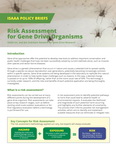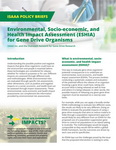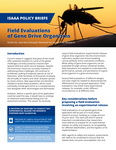Gene Drive Policy Briefs 2022
In partnership with the Outreach Network for Gene Drive Research, ISAAA Inc. launches these policy briefs on Gene Drive:
 Risk Assessment for Gene Drive Organisms - The brief recommends that risk assessments must be consistent with the principle of case-by-case assessment since there are various types of gene drive constructs developed for different applications and contexts. The involvement of stakeholders must also be considered as a vital part of the process to address their concerns appropriately.
Risk Assessment for Gene Drive Organisms - The brief recommends that risk assessments must be consistent with the principle of case-by-case assessment since there are various types of gene drive constructs developed for different applications and contexts. The involvement of stakeholders must also be considered as a vital part of the process to address their concerns appropriately.  Environmental, Socio-economic, and Health Impact Assessment (ESHIA) for Gene Drive Organisms - According to the policy brief, ESHIA is helpful because it offers an analysis that helps assess the advantages and disadvantages of action and inaction, which is important to inform decisions. ESHIA and ERA complement each other, and their findings should be considered in decision-making.
Environmental, Socio-economic, and Health Impact Assessment (ESHIA) for Gene Drive Organisms - According to the policy brief, ESHIA is helpful because it offers an analysis that helps assess the advantages and disadvantages of action and inaction, which is important to inform decisions. ESHIA and ERA complement each other, and their findings should be considered in decision-making.  Field Evaluations of Gene Drive Organisms - According to the policy brief, field evaluations are needed to understand the performance, spread, and persistence of a gene drive organism in a given environment. Several field evaluations of different designs and sizes might be needed to demonstrate the effectiveness of a proposed application. Field evaluations for proposed gene drive applications are part of a multi-phase research process and will inform several important considerations that researchers must address to prepare for an experimental release, including safety and impacts, acceptability for affected stakeholders, and the logistics of its implementation.
Field Evaluations of Gene Drive Organisms - According to the policy brief, field evaluations are needed to understand the performance, spread, and persistence of a gene drive organism in a given environment. Several field evaluations of different designs and sizes might be needed to demonstrate the effectiveness of a proposed application. Field evaluations for proposed gene drive applications are part of a multi-phase research process and will inform several important considerations that researchers must address to prepare for an experimental release, including safety and impacts, acceptability for affected stakeholders, and the logistics of its implementation.
